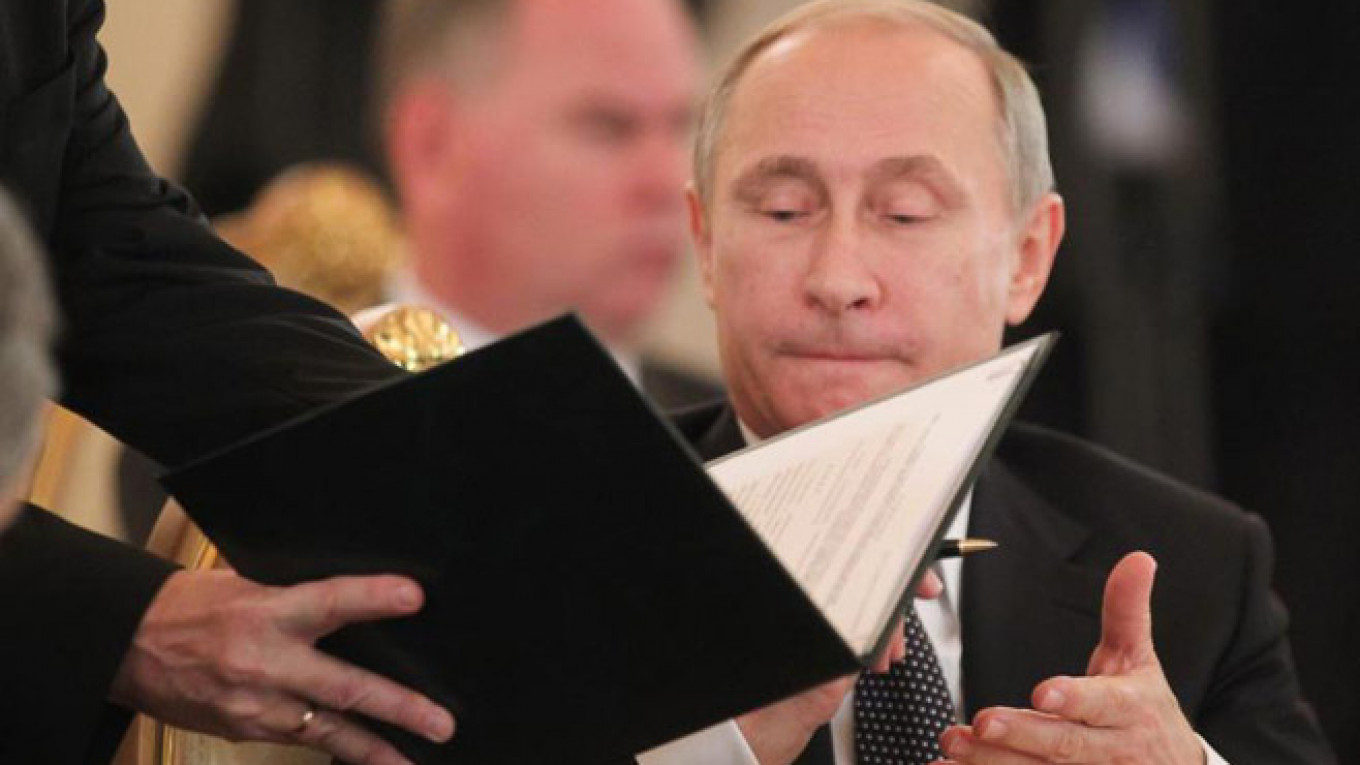A bill submitted by President Vladimir Putin to the State Duma on Thursday may offer nongovernmental organizations that have been deemed "foreign agents" the chance to clear their names.
In accordance with a controversial 2012 law, any NGO that receives foreign funding and conducts political activities is required to register as a "foreign agent" with the Justice Ministry or face fines and legal consequences.
The law has attracted a great deal of condemnation since its entry into force. Among other things, critics have argued that the law dealt a blow to Russian civil society and that its vaguely defined notion of "political activity" allows prosecutors to use it as a political weapon.
The State Duma announced on Thursday that Putin had submitted a bill addressing some of the critics' more pressing concerns.
Several months earlier, human rights ombudsman Ella Pamfilova met with Putin to lament the "paradoxical situation" that the law had created by providing for the inclusion of organizations on a federal register, but failing to provide a mechanism for their removal.
Pamfilova initiated the bill, which she teamed up with human rights activists and Justice Ministry representatives to draft. An explanatory note included with the legislation said the bill was created to remedy the paradox she had complained of to Putin.
"With the goal of filling the void [in the current legislation], the bill stipulates that in order to be excluded from the register, an organization must submit an application to the authorized federal body for approval," the bill reads, according to a copy published on the State Duma's website.
"The procedure for inclusion on the list is imperfect, many organizations believe they have been included baselessly," Pamfilova said in comments carried by news site Gazeta.ru on Wednesday. "Removal from the list, in this case, is at least an instrument that gives the chance [for organizations] to prove that in many cases the move was baseless."
The draft law stipulates that once an organization has submitted an application to contest its inclusion on the list, prosecutors must conduct an inspection of the organization to determine whether to grant its exclusion from the register.
This exclusion would be granted if an organization can prove that it has not accepted foreign funding or conducted political activities within the past year.
Repeat offenders face harsher requirements: They must prove that they have not accepted foreign funding or engaged in political activity for the past three years.
The legislation offers another interesting proposal for organizations that cannot meet these requirements: If within three months from the time of inclusion they not only stop accepting foreign funding, but give it back, they can be taken off the list without having to wait a full year.
Sergei Lukashevsky, head of the Sakharov Center, which itself is included on the "foreign agents" list, told Gazeta.ru the amendments would do nothing to resolve the main problem — which is that the definition of "political activity" is still unclear.
"The activity of any public organization that in one way or another works in the public space can be considered 'political' from the standpoint of law enforcement," Lukashevsky was quoted as saying.
Currently, the "foreign agents" list contains 36 organizations.
Contact the author at a.quinn@imedia.ru
A Message from The Moscow Times:
Dear readers,
We are facing unprecedented challenges. Russia's Prosecutor General's Office has designated The Moscow Times as an "undesirable" organization, criminalizing our work and putting our staff at risk of prosecution. This follows our earlier unjust labeling as a "foreign agent."
These actions are direct attempts to silence independent journalism in Russia. The authorities claim our work "discredits the decisions of the Russian leadership." We see things differently: we strive to provide accurate, unbiased reporting on Russia.
We, the journalists of The Moscow Times, refuse to be silenced. But to continue our work, we need your help.
Your support, no matter how small, makes a world of difference. If you can, please support us monthly starting from just $2. It's quick to set up, and every contribution makes a significant impact.
By supporting The Moscow Times, you're defending open, independent journalism in the face of repression. Thank you for standing with us.
Remind me later.






